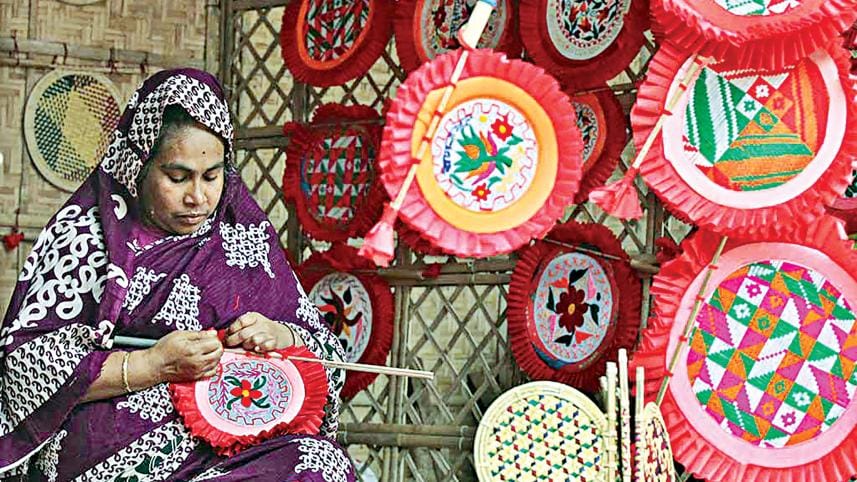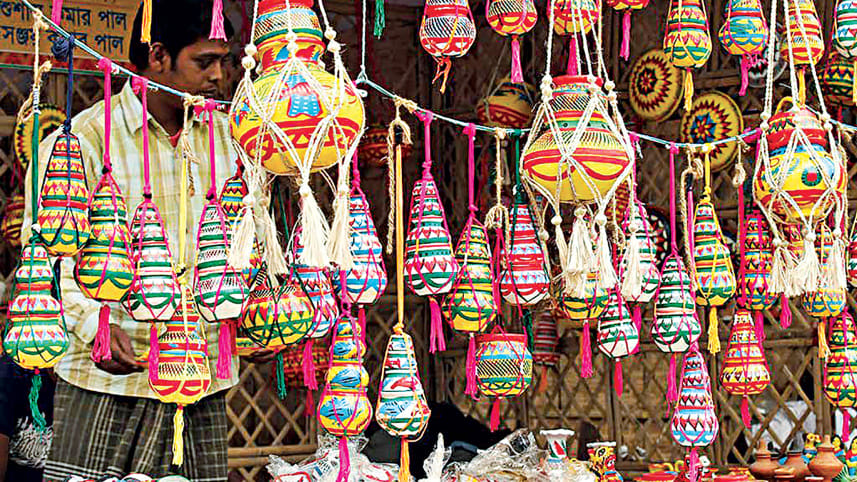Adopt an artisan and save our heritage

Sobita Modi, a woman in her early fifties, had to take charge of her life with no aid from anyone else. Having to raise her children all by herself and ensure a proper education for all of them, she had to work relentlessly, weaving cane mats (shitol pati) and selling them to merchants at the district bazaar in Munshiganj. Even that was not enough because at the end of the day, there would not be enough food on the table and Modi had to go empty-bellied on most days, just to be able to feed her entire household with the bare essentials. The pandemic only made things worse for Modi.
"I am a weaver for cane mats and there isn't any other trade that I am experienced in, nor are my children. I am living on leased land, borrowed money and my business has been completely put to a halt for the time being. We will all die if this continues any longer," said Modi.

Modi's livelihood is not any different from the thousands of artisan families suffering as a result of the viral pandemic.
Ashutosh, another struggling master craftsman of our country, shares his ordeal.
Born and brought up in Sonargaon, Ashutosh's family had always been related to crafting wooden dolls (kather putul). After years of struggle, things were finally looking up for him, as Ashutosh managed to acquire a shop at the Sonargaon Museum and display his artwork over there.
"I used to make considerable money, especially during the Baishakh festivities. A few local craft shops from the capital used to purchase my products in bulk and sell them in the city. This pandemic ruined everything; a huge amount of money is stuck as investments. Meanwhile, my family needs to be fed, and I have no clue as to how our lives will go on if the lockdown continues any further," said Ashutosh.
These are just two separate narratives, amongst thousands suffering as a result of COVID-19.
The artisan community, in general, are unique. They are an extremely talented and fine-skilled group of people who choose not to master any other skill during their lifetime because they wish to hone their already existing skills and achieve brilliance.
"The various master craftsmen of our society help illustrate our heritage and legacy. Without them, we would not even have an identity. So, it is imperative that we save these skilled groups of people, strengthening the local economy in return and safeguard our cultural identity, especially during the prevalent crisis situation," stated Maheen Khan, the Founder President of Fashion Design Council of Bangladesh (FDCB).

Based on this understanding, FDCB has taken the pledge to support the most vulnerable artisan communities of our country, which include the high risk, elderly, and impoverished section of the craft society. FDCB is also seeking support in their noble venture to be able to reach out extensively and for a worthy period of time.
"Our initiative is currently meant for three months. Each month, we hope to provide the artisan families in the mentioned category, with Tk 5,000 cash assistance, so that their basic necessities are met and they can survive through the temporary fallout," assured Khan.
For the time being, both Ashutosh and Sobita Modi's families have been facilitated with donations under the #ADOPTANARTISAN program by FDCB, and many more families such as theirs can be helped if only the rest of us unite and lend a hand to the fashion council's noble initiative.
Only a united effort in these times of crisis can help protect and support the artisan communities who have been persistently putting Bangladesh at the forefront of the global arena for the longest conceivable time.
Essentials —
#ADOPTANARTISAN
FDCB BKASH: 01707063537
Photo courtesy: Maheen Khan




 For all latest news, follow The Daily Star's Google News channel.
For all latest news, follow The Daily Star's Google News channel.
Comments